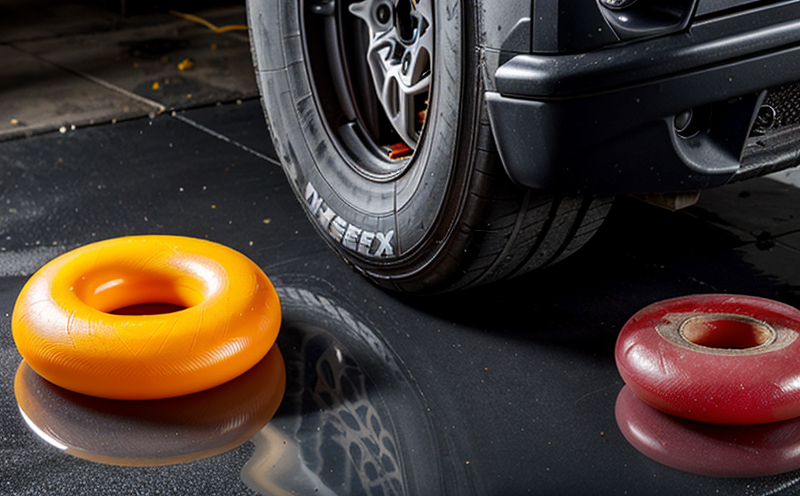Testing the effect of chemical exposure on elastomers and rubber materials
The Crucial Role of Testing Chemical Exposure on Elastomers and Rubber Materials Ensuring Business Safety and Compliance
In todays fast-paced industrial landscape, businesses are constantly seeking innovative ways to improve product performance, safety, and compliance. One often-overlooked aspect of this pursuit is the effect of chemical exposure on elastomers and rubber materials. These essential components are ubiquitous in various industries, including automotive, aerospace, medical devices, and consumer goods. However, their susceptibility to chemical degradation can have far-reaching consequences if left unaddressed.
What is Testing the Effect of Chemical Exposure on Elastomers and Rubber Materials?
Testing the effect of chemical exposure on elastomers and rubber materials involves assessing the impact of various chemicals on these sensitive materials. This laboratory service enables businesses to evaluate how different substances, such as fuels, lubricants, cleaning agents, or solvents, interact with their products. The primary goal is to identify potential weaknesses and determine whether the material can withstand exposure to specific chemicals without compromising its integrity.
Why is Testing the Effect of Chemical Exposure on Elastomers and Rubber Materials Essential for Businesses?
The significance of testing chemical exposure cannot be overstated. Inadequate assessment of elastomer and rubber material susceptibility can lead to
Product Failure Untreated materials may degrade prematurely, resulting in equipment failure, safety hazards, or costly product recalls.
Compliance Issues Non-compliance with industry regulations or standards can incur significant fines, penalties, and reputational damage.
Supply Chain Disruptions Material degradation can cause production downtime, disrupting supply chains and impacting customer relationships.
By conducting thorough testing, businesses can
Ensure Product Safety Confirm the materials ability to withstand exposure to specific chemicals, ensuring a safe working environment for employees and customers.
Meet Industry Regulations Comply with industry standards and regulations, such as those set by regulatory bodies like ISO, FDA, or NIOSH.
Maintain Supply Chain Reliability Identify potential weaknesses and implement corrective actions to prevent material degradation and related supply chain disruptions.
Key Benefits of Using Eurolabs Testing Services
Eurolab offers a comprehensive range of testing services for elastomers and rubber materials. By partnering with our experienced team, you can
Gain Accurate Material Properties Receive detailed reports outlining the effects of chemical exposure on your materials, ensuring informed decision-making.
Optimize Product Performance Develop products that meet or exceed industry standards, reducing the risk of material degradation and associated consequences.
Enhance Supply Chain Resilience Proactively address potential weaknesses, minimizing disruptions to production and supply chains.
Comprehensive Testing Services
Eurolabs expert laboratory technicians employ state-of-the-art equipment and rigorous testing protocols to evaluate various aspects of elastomer and rubber material behavior under chemical exposure. Our services include
Chemical Resistance Testing Evaluates the effects of specific chemicals on material properties, such as tensile strength, hardness, or elongation at break.
Swelling and Extraction Tests Determines how materials absorb and release chemicals, identifying potential weaknesses in material integrity.
Dynamic Mechanical Analysis (DMA) Measures material viscoelastic behavior under various conditions, including temperature and frequency changes.
Frequently Asked Questions
What types of elastomers and rubber materials can be tested?
Various types, including natural and synthetic rubber, silicone, nitrile, and fluoroelastomer.
Which chemicals can be used for testing?
A wide range of chemicals, including fuels, lubricants, cleaning agents, solvents, and other substances commonly encountered in industrial settings.
What is the typical turnaround time for test results?
Results are typically available within 1-4 weeks, depending on the complexity of the tests and material properties.
Are your testing services accredited to industry standards?
Yes, Eurolabs laboratory is fully accredited to industry standards, ensuring the highest level of quality and reliability.
Conclusion
In an increasingly complex and competitive business environment, it is crucial for companies to prioritize product safety, compliance, and supply chain resilience. By leveraging Eurolabs comprehensive testing services, you can
Mitigate Product Failure Risks Confidently assess material performance under chemical exposure.
Ensure Regulatory Compliance Meet industry standards and regulations with confidence.
Optimize Supply Chain Reliability Proactively address potential weaknesses and maintain a competitive edge.
Dont compromise on your businesss safety, compliance, or supply chain resilience. Choose Eurolab for all your elastomer and rubber material testing needs.
-
Testing chemical resistance of materials in various industrial environments
-
Evaluating how different materials react when exposed to specific chemicals
-
Assessing the long-term compatibility of materials with various chemical substances
-
Determining how chemicals affect the physical properties of metals, plastics, and ceramics
-
Simulating material failure under different chemical exposures in manufacturing processes
-
Evaluating the impact of chemical exposure on material integrity in harsh environments
-
Ensuring that chemical formulations do not compromise the strength or performance of materials
-
Assessing compatibility with materials used in packaging, coatings, and containers
-
Testing the impact of aggressive chemicals on seals, gaskets, and other critical components
-
Evaluating the interaction between different chemicals and materials used in consumer products
-
Assessing the compatibility of composite materials with aggressive chemicals used in industrial applications
-
Ensuring that chemicals do not cause degradation or corrosion of equipment, pipelines, or tanks
-
Simulating different chemical exposure scenarios to determine material suitability and durability
-
Testing materials for compatibility with chemicals at different temperatures, pressures, and conditions
-
Evaluating chemical interactions between two or more substances and their effect on material properties
-
Testing the compatibility of materials used in the automotive, aerospace, and medical industries with chemicals
-
Determining the best material choices for applications involving aggressive chemical environments
-
Testing the effects of chemical exposure on surface finishes, including coatings and plating
-
Ensuring the safe use of chemicals in consumer goods by testing material compatibility for health and safety
-
Evaluating the stability of materials over time when exposed to chemicals in manufacturing and storage
-
Determining the performance of coatings and films when exposed to various chemicals used in industrial processes




